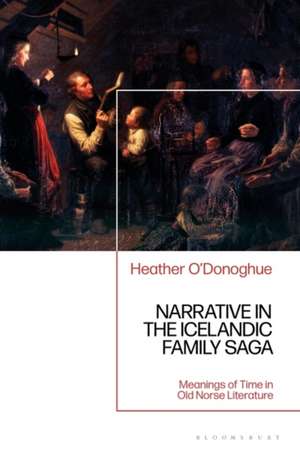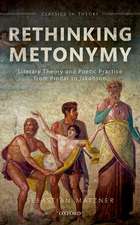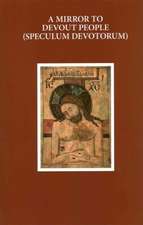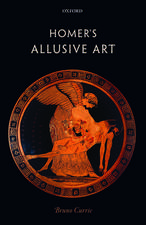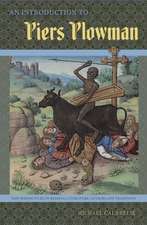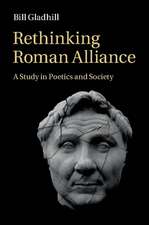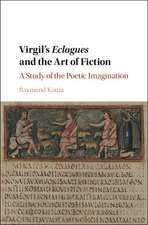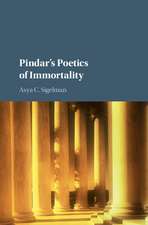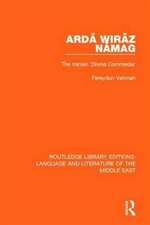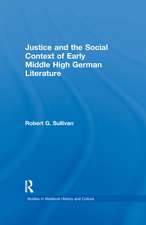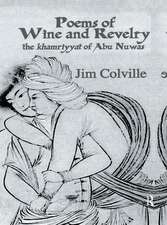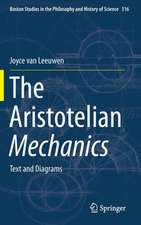Narrative in the Icelandic Family Saga: Meanings of Time in Old Norse Literature
Autor Heather O'Donoghueen Limba Engleză Paperback – 24 aug 2022
| Toate formatele și edițiile | Preț | Express |
|---|---|---|
| Paperback (1) | 197.59 lei 6-8 săpt. | +72.90 lei 4-10 zile |
| Bloomsbury Publishing – 24 aug 2022 | 197.59 lei 6-8 săpt. | +72.90 lei 4-10 zile |
| Hardback (1) | 568.87 lei 6-8 săpt. | |
| Bloomsbury Publishing – 24 feb 2021 | 568.87 lei 6-8 săpt. |
Preț: 197.59 lei
Preț vechi: 257.78 lei
-23% Nou
Puncte Express: 296
Preț estimativ în valută:
37.81€ • 39.58$ • 31.28£
37.81€ • 39.58$ • 31.28£
Carte tipărită la comandă
Livrare economică 07-21 aprilie
Livrare express 28 februarie-06 martie pentru 82.89 lei
Preluare comenzi: 021 569.72.76
Specificații
ISBN-13: 9781350211636
ISBN-10: 135021163X
Pagini: 232
Dimensiuni: 156 x 234 x 17 mm
Greutate: 0.33 kg
Editura: Bloomsbury Publishing
Colecția Bloomsbury Academic
Locul publicării:London, United Kingdom
ISBN-10: 135021163X
Pagini: 232
Dimensiuni: 156 x 234 x 17 mm
Greutate: 0.33 kg
Editura: Bloomsbury Publishing
Colecția Bloomsbury Academic
Locul publicării:London, United Kingdom
Caracteristici
The first examination of the concepts of narrative voice and time in the Icelandic Sagas
Notă biografică
Heather O'Donoghue is Professor of Old Norse at University of Oxford, UK and a Fellow of Linacre College, Oxford, UK. She is the author of The Genesis of a Saga Narrative (1991), Old Norse Icelandic Literature: A Short Introduction (2004), Skaldic Verse and the Poetics of Saga Narrative (2005), From Asgard to Valhalla: The Remarkable History of the Norse Myths (2007) and English Poetry and Old Norse Myth: A History (2014). She has also broadcast with the BBC on the topic of the Norse Gods.
Cuprins
AcknowledgementsIntroduction1. The Representation of External Time2. The Management of Narrative Time: Duration3. The Management of Narrative Time: Order4. The Voice of the Silent Narrator5. Withheld KnowledgeConclusionBibliographyIndex
Recenzii
This important new study explores the often-ignored reality that Iceland's family sagas focus squarely on human society. Instead of pursuing the usual literary questions of invention or fantasy, Prof. O'Donohuge delves deeply into the "real-feeling" world of deceptively familiar human characters in everyday, though dramatic circumstances as she focuses on the remarkably consistent portrait of early medieval Icelandic society. Saga authors were, O'Donohuge states, "working with an authentic and detailed picture of their ancestral society accurately transmitted via oral tradition." Here is a work that has much to teach us and contributes significantly to the field.
No reader of this book will emerge unconvinced of the artistry of the saga authors, or of the current author's position as one of the foremost saga scholars of our generation. The lucidity and ease with which O'Donoghue approaches the central subject of time in saga narrative ensure that this book will become essential reading both for established scholars and for anyone looking to learn more about the sagas.
A wonderfully eye-opening exploration of not only the Sagas of Icelanders as a genre, but also broader ideas about how narrative can act as a connecting bridge between history and fiction. By turns philosophical and theoretical, O'Donoghue paints a vivid picture of the saga world and the passage, perception, and representation of time: the rhythms of the seasons, the cultural events marking the social calendar, the deeper historical time spanning the generations. A skillful analysis that reveals the considerable narratological talents of the Icelandic saga authors and the richness of the stories themselves.
Heather O'Donoghue studies narrative time, specifically the representation and production of time in six sagas of the Icelanders, arguing that the saga narrators withheld some details yet revealed others, shaping the representation of narrative time and their readers' experience of order, silence, and duration. Her groundbreaking work on narratorial time management will ensure that readers discern the nuances of the self-effacing narrators more and in ways that scholars have never before appreciated. This new look at an old subject is approachable, informative, and well worth reading.
No reader of this book will emerge unconvinced of the artistry of the saga authors, or of the current author's position as one of the foremost saga scholars of our generation. The lucidity and ease with which O'Donoghue approaches the central subject of time in saga narrative ensure that this book will become essential reading both for established scholars and for anyone looking to learn more about the sagas.
A wonderfully eye-opening exploration of not only the Sagas of Icelanders as a genre, but also broader ideas about how narrative can act as a connecting bridge between history and fiction. By turns philosophical and theoretical, O'Donoghue paints a vivid picture of the saga world and the passage, perception, and representation of time: the rhythms of the seasons, the cultural events marking the social calendar, the deeper historical time spanning the generations. A skillful analysis that reveals the considerable narratological talents of the Icelandic saga authors and the richness of the stories themselves.
Heather O'Donoghue studies narrative time, specifically the representation and production of time in six sagas of the Icelanders, arguing that the saga narrators withheld some details yet revealed others, shaping the representation of narrative time and their readers' experience of order, silence, and duration. Her groundbreaking work on narratorial time management will ensure that readers discern the nuances of the self-effacing narrators more and in ways that scholars have never before appreciated. This new look at an old subject is approachable, informative, and well worth reading.
